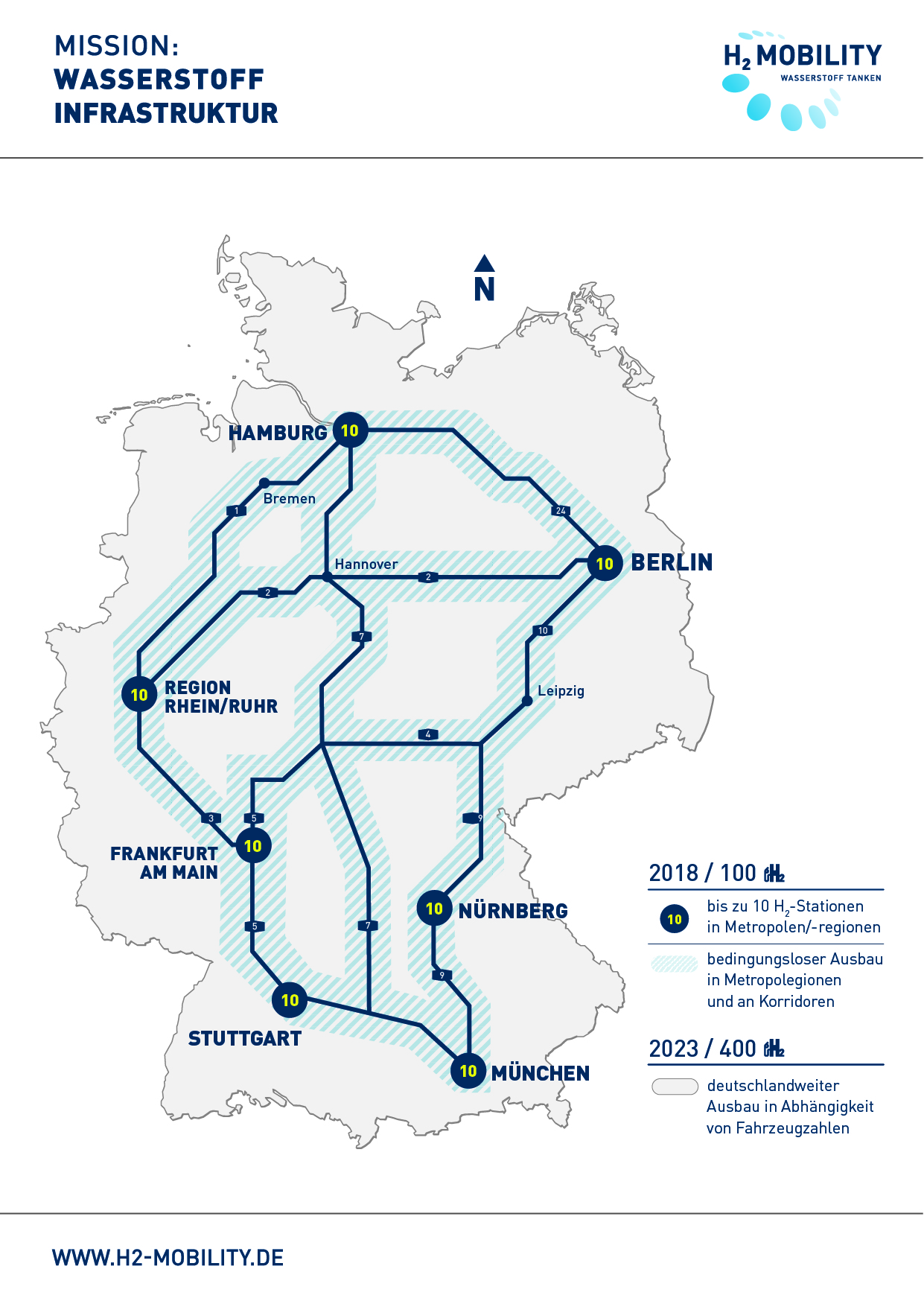Halle (Saale) gets hydrogen filling station from H2 MOBILITY
Halle (Saale) is the winner of the first national call for locations by H2 MOBILITY. A consortium of companies and research institutions in the city on the River Saale, coordinated by the isw, Institut für Strukturpolitik und Wirtschaftsförderung gGmbH and the cooperation network Chemie+, has won against almost 30 other applicants and will now receive a hydrogen station.

The new filling station will be integrated into the existing PS Union multi-energy filling station (conventional filling station offering natural gas and electricity) at the Selkestraße site in Halle (Saale). It lies in a convenient location near the A9 and A14 freeways and thus creates an important link to the north-south and east-west axes in the hydrogen filling station network.
Nationwide, 100 hydrogen filling stations are expected to initially be created by 2018. H2 MOBILITY is thus laying the foundation for the market launch of environmentally friendly electric vehicles with a hydrogen fuel cell propulsion system.
With its call for locations, H2 MOBILITY Deutschland GmbH & Co.KG has, for the first time, added a further aspect to the primarily theoretical, study-based network planning approach by encouraging regions to get involved directly. The company has received around thirty applications.
Halle (Saale) impressed the jury in particular with the vision of the climate-neutral, networked, and integrated model city, car-sharing, and a high level of commitment. In the next twelve to fourteen months, H2 MOBILITY will now be testing, commissioning, and building a further hydrogen station in Halle (Saale). »We are delighted,« says Ralf B. Wehrspohn, Director of the Fraunhofer Institute for Microstructure of Materials and Systems IMWS and Spokesman for the Chemie+ network, and emphasizes, »The hydrogen station helps us in our climate protection efforts and will create important impetus in the region. Hydrogen is and remains an important factor in reorganizing our energy supply.«
It is already predicted that more than 25 vehicles fueled by hydrogen will be permanently on the roads in the region, and buses are also expected to be operated. The hydrogen filling station in Halle (Saale) will be integrated into the innovative mobility concept in the region: The car-sharing service from the PS Union Group ‘JEZ! mobil’ will gain ten hydrogen-powered vehicles. What’s more, the Halle public utility companies will operate hydrogen vehicles as part of company car-sharing. Fraunhofer IMWS and the Fraunhofer Center for Silicon Photovoltaics CSP will also equip their fleets with hydrogen vehicles and support the undertaking in terms of research where required. Other companies adding hydrogen-powered vehicles to their fleets include municipal waste disposal and residential companies.
The undertaking is primarily coordinated and supervised by isw, the Institut für Strukturpolitik und Wirtschaftsförderung gGmbH, and the cooperation network Chemie+. What’s more, the competition ‘Future city halle.neu.stadt 2050: climate-neutral – networked – integrated’ offers in-depth collaborations and possibilities for implementing further research projects in the field of sustainable mobility, and material and energy innovation. The winner of the call for locations is officially announced at the future conference ‘halle.neu.stadt 2050 – on the path to the future city’ on June 15, 2017, at 12 noon in the presence of Dr. Reiner Haseloff, Minister-President of Saxony-Anhalt, and Dr. Bernd Wiegand, Mayor of Halle (Saale).
Hydrogen, H2 for short, above all plays a major role in discussions concerning how Germany can achieve its climate goals. Road traffic is undoubtedly a significant emitter. In order to achieve the agreed climate protection aims, the mobility sector must switch over to alternative drives by 95 percent. One possible way of expanding the range of fuel on offer in the transport sector in a climate-friendly way is hydrogen. Hydrogen produced with renewable energies can help reduce climate-damaging emissions significantly. Operating a fuel cell vehicle does not generate any CO2 or nitrogen oxide (NOx), or fine dust.
Sufficient fuel cell vehicles and a corresponding infrastructure are required in order to make hydrogen mobility a success story in the energy transition in terms of road transport. The joint venture H2 MOBILITY Deutschland GmbH & Co.KG, a merger of Air Liquide, Daimler, Linde, OMV, Shell, and Total, was founded for this very task. The company’s mission is to construct and operate up to 400 hydrogen stations by 2023. The filling station rollout is based on a study that defined seven regions in Germany. Up to ten stations should ensure a comprehensive hydrogen supply in Berlin, Hamburg, Frankfurt, Munich, Nuremberg, Rhine-Ruhr, and Stuttgart, as well as other filling stations on highways and freeways. »The success of the first call for locations has motivated us to take this path more often in the future,« says Nikolas Iwan, Managing Director at H2 MOBILITY. »In Germany, there is great potential for working with outstanding hydrogen pioneers. We are currently working on a second call,« he explains.
Fuel cell vehicles impress with short filling times of just three minutes and ranges of between 500 and 700 km, comparable with those of standard cars. Besides Daimler, which has already developed a small series of fuel cell vehicles with the Mercedes-Benz B-Class F-Cell and introduced the Mercedes-Benz GLC F-Cell onto the market from 2017, Toyota and Hyundai also currently offer cars with fuel cell drives.